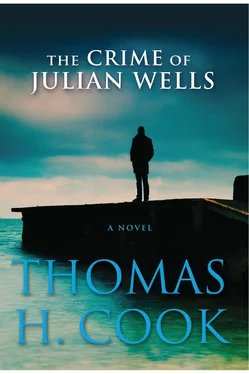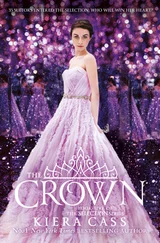Thomas Cook - The Crime of Julian Wells
Здесь есть возможность читать онлайн «Thomas Cook - The Crime of Julian Wells» весь текст электронной книги совершенно бесплатно (целиком полную версию без сокращений). В некоторых случаях можно слушать аудио, скачать через торрент в формате fb2 и присутствует краткое содержание. Год выпуска: 2012, ISBN: 2012, Издательство: Grove Press, Жанр: Криминальный детектив, на английском языке. Описание произведения, (предисловие) а так же отзывы посетителей доступны на портале библиотеки ЛибКат.
- Название:The Crime of Julian Wells
- Автор:
- Издательство:Grove Press
- Жанр:
- Год:2012
- ISBN:9780802194589
- Рейтинг книги:5 / 5. Голосов: 1
-
Избранное:Добавить в избранное
- Отзывы:
-
Ваша оценка:
- 100
- 1
- 2
- 3
- 4
- 5
The Crime of Julian Wells: краткое содержание, описание и аннотация
Предлагаем к чтению аннотацию, описание, краткое содержание или предисловие (зависит от того, что написал сам автор книги «The Crime of Julian Wells»). Если вы не нашли необходимую информацию о книге — напишите в комментариях, мы постараемся отыскать её.
The Crime of Julian Wells — читать онлайн бесплатно полную книгу (весь текст) целиком
Ниже представлен текст книги, разбитый по страницам. Система сохранения места последней прочитанной страницы, позволяет с удобством читать онлайн бесплатно книгу «The Crime of Julian Wells», без необходимости каждый раз заново искать на чём Вы остановились. Поставьте закладку, и сможете в любой момент перейти на страницу, на которой закончили чтение.
Интервал:
Закладка:
“No, I don’t think he ever fell in love,” I answered, and again felt the pain of losing my wife three years before, a hole in my heart I could find no way to heal.
Loretta reached for her drink but only stared into it. “It was Argentina,” she said, her tone quite thoughtful. “The map Julian was looking at the day he died. Maybe he was thinking about that trip the two of you made down there.”
“That was thirty years ago, Loretta,” I said. “Why would he have been thinking about that?”
She released a breath that was like a tired breeze, driven too far over rough terrain. “Like the winds from off the Karst,” as Julian had once written in one of his college essays, “thirsting for the Adriatic.” Such had been his style in the high days of his youth, his language predictably stilted, cluttered with allusions to places he’d never been. So different from what his work later became, those emaciated sentences, so darkly spare.
“A map of Argentina,” Loretta said softly, almost to herself. “Do you think he was on the trail of something down there?”
“It’s possible, I suppose.”
But on the trail of what? I wondered, though there seemed no way to know in what direction Julian was heading when he decided to go to the pond instead.
“By the way,” I said, “have you read the manuscript Julian brought back?”
“No,” Loretta said as if my question had only drawn her deeper into Julian’s mystery. “He cut out their eyes, you know, that Russian horror. And that’s not all, of course.”
“Yes, I know what Chikatilo did,” I said with a wave of the hand.
Loretta’s attention drifted toward the window. “We were in Rome, Julian and I. Just children. We were in that little piazza, the Campidoglio. He said it looked perfectly square because Michelangelo had designed it to look perfectly square by widening it here and elongating it there. It wasn’t actually square at all. It was a masterful trick of perspective. ‘It’s distortion that creates perfection, Loretta,’ he said.”
She turned toward me and I saw a subtle shift in the mosaic of this woman, and with that shift I realized just how deeply Loretta had loved Julian, and that she always would. He’d been the older brother who had taken time with her, who had offered her his thoughts, his feelings, and then, for some reason she would never know, had chosen to remove himself for years on end, one of life’s true vagabonds.
“Julian was good,” she said softly. “That’s what I’ll miss. His goodness.”
I felt a scuttling movement in the place where my youth lay like a discarded old traveling case, timeworn and battered, layered in gray dust. I glanced at my watch. “I’m sorry, but I have to look in on my father.”
Loretta nodded. “How is he?”
For the first time in a long time, I felt an uneasy loosening in the grip I was careful to maintain upon myself.
“Fading,” I said. I looked toward the window, where the rain had not let up. “Bad night.” I rose, grabbed my coat, and drew it on. “Well, I’ll see you at the service on Friday.”
Loretta stared at her now-empty glass. “Do you think you knew him, Philip?”
“Not enough to have saved him, evidently,” I answered. “Which means I’ll always be silent in that boat.”
She looked up at me. “I guess we all leave a trail of little pebbles scattered on the forest floor,” she said. “But I’ll always wonder where those pebbles would have led to with Julian.”
I had no answer to this question, nor ever expected to have one. She saw my retreat, and so offered her own admittedly inadequate one.
“Just to more pebbles, I suppose,” she added with a small, sad smile.
I gathered up my coat. “I’m afraid so.”
I expected this to be the end of it, but something behind Loretta’s eyes darkened. “I’m silent in that boat, too, you know,” she said.
The feeling I saw rise in her at that moment was striking in its subdued passion. She had worked at home for years and years, while nursing Colin through his long dying, and yet, for all that, something still sparkled in her, a fierce curiosity.
“And if I never find those words, I feel that I’ll live a bit like poor Masha,” she said. “Dressed in black, in mourning for my life.”
They were dramatic words, of course, but the moment was dramatic, too, I thought, and in its aftermath, as I stepped outside and hailed a cab, it struck me that both for her and for me, what she’d said was true. A man we’d both loved had taken his own life. He had done so alone and had given neither of us a chance to stop him.
There are times when the very earth seems poised to move against us, and at that instant, I recalled Julian at Two Groves, playing croquet with my father, while Loretta and I looked on. He’d hit the ball with both verve and confidence, which had given his game a dead-on accuracy that even then I suspected he would later apply to whatever he chose to do. Upon his inevitable victory, he had leaped into a shimmering summer air that had seemed to embrace him.
How, from so bright a beginning, I wondered, had the world conspired to bring him to so black an end?
2
There are some bridges you cannot cross again, and so your only choice is simply to make the best of the shore you have chosen. And so, in the taxi, heading toward my father’s apartment, I concentrated on my life’s many satisfactions. The smaller ones, like good food, and the larger ones, like the years I’d had with my wife-comforts that Julian had not found in his youth and later chose not to seek.
For some reason, these thoughts brought to mind a passage from one of Julian’s books, his description of Henri Landru. He’d written that the famous French serial killer had begun to talk as his date with the guillotine grew near, even going so far as to make a crude drawing of the kitchen where the bodies had been burned. Death’s approach had turned him quite gossipy, Julian said, so that in the last days, Landru had been less the condemned man silently brooding on his crimes than a washerwoman chatting in the market square.
Not so Julian, I thought now, and instantly imagined him alone on the sunporch with his map of Argentina and God only knew what grim thoughts in his mind. Had he, in his last hours, inexplicably returned to the first tragedy that touched him? And if so, why?
There could be no answer to these questions, of course, so rather than pursue a fruitless trail, I drifted through the mundane details of Julian’s early life.
He was born upper-middle-class, his father a State Department official who’d been one of my father’s closest friends. His mother had died giving birth to Loretta, and after that Julian and his sister had been overseen by a series of nannies. By the time Julian and Loretta were in grade school, James Wells had retired because of a heart condition. A few years later, he’d bought the Montauk farmhouse, in which he had died at age fifty-five.
That death had devastated Julian, and something of his lost father settled over him for many months, a lingering presence, like the ghost of Hamlet’s father, which is exactly how Julian once described it. In the wake of his father’s death, he seemed ever more determined to make a mark in life. Even so, the space his father had occupied remained empty, a void never filled. “A little boy needs a hero,” he once said to me, though without adding what I knew was on his mind, the fact that with his father gone, he’d lost that hero in his own life.
A cautious man, Julian’s father had left his two children, Julian, fifteen, and Loretta, twelve, well fixed, mostly by means of a substantial life insurance policy, the proceeds from which had retired the Montauk mortgage. A bachelor uncle had promptly moved into the house and from there attempted to assume the role of father. Boarding school had taken up the remaining slack. College tuitions had later absorbed what was left of the inheritance, so that by the time Julian graduated from Columbia and Loretta from Barnard, only the Montauk house remained.
Читать дальшеИнтервал:
Закладка:
Похожие книги на «The Crime of Julian Wells»
Представляем Вашему вниманию похожие книги на «The Crime of Julian Wells» списком для выбора. Мы отобрали схожую по названию и смыслу литературу в надежде предоставить читателям больше вариантов отыскать новые, интересные, ещё непрочитанные произведения.
Обсуждение, отзывы о книге «The Crime of Julian Wells» и просто собственные мнения читателей. Оставьте ваши комментарии, напишите, что Вы думаете о произведении, его смысле или главных героях. Укажите что конкретно понравилось, а что нет, и почему Вы так считаете.












